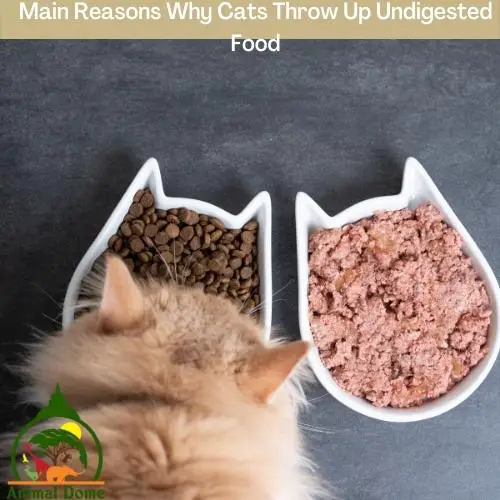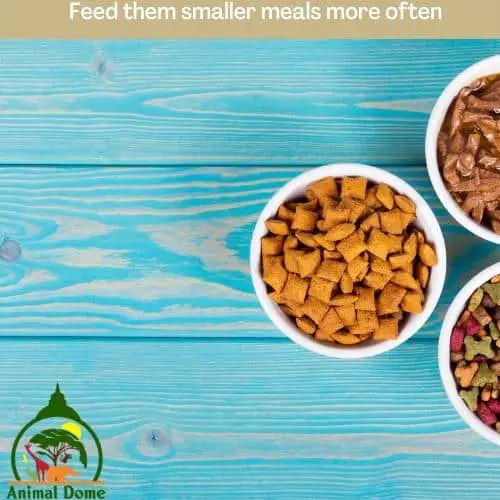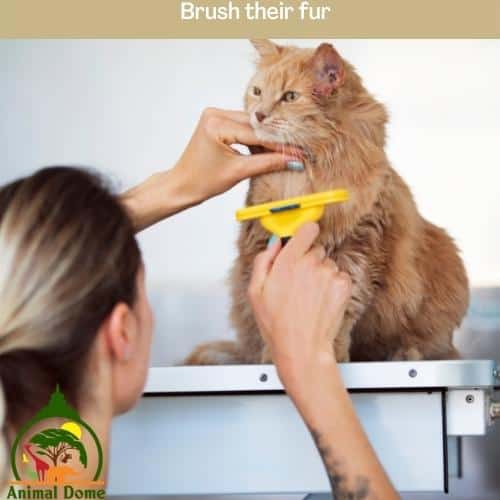Have you ever asked yourself, “Why my cat is throwing up undigested food?” Well, it’s actually quite common, and there can be a few different reasons why it’s happening.
Maybe your cat is vomiting undigested food because it’s eating too fast. Another possibility is that your cat has a food intolerance or allergy. If your cat throws up after eating certain foods, it’s possible that they are unable to digest those foods properly.
In this blog post, we’ll take a look at some of the most common reasons why cats throw up undigested food, as well as what you can do to help prevent it from happening.
So, if you’ve been wondering what might be causing your cat’s upset stomach, keep reading for more information.
Main Reasons Why Cats Throw Up Undigested Food

There can be a lot of reasons why your cat is throwing up undigested food. It might be because of any allergy, food intolerance, digestive issues, hairballs, stress, or simply your cat just eats too fast and throws up quickly.
Let’s take a deep dive into these reasons for a better understanding.
Eating Too Fast
If your cat is eating too fast, it’s likely that they are gulping down their food without properly chewing it. This can cause them to vomit undigested food soon after eating.
Food Intolerance or Allergy
If your cat has a food intolerance or allergy, it may vomit undigested food shortly after eating certain foods. If you think this might be the case, it’s important to talk to your vet and figure out which foods are causing the issue.
Digestive Issues
Certain digestive issues can cause a cat to vomit undigested food. For example, if your cat has inflammatory bowel disease (IBD), it may have trouble digesting their food properly.
IBD is a chronic inflammatory condition that can affect the digestive system. If you think your cat may have IBD, it’s important to talk to your vet so they can diagnose and treat the issue.
Hairballs
Hairballs are another common reason why cats vomit undigested food. When cats groom themselves, they can ingest a lot of hair. Over time, this hair can build up in their stomach and form into a hairball. If a hairball gets too big, it can cause your cat to vomit undigested food.
Stress
Stress can also be a factor in causing your cat to vomit undigested food. If your cat is experiencing stress, it can affect its digestive system and lead to vomiting.
Also read:
How do I stop my cat from throwing up undigested food?
If your cat is throwing up undigested food frequently, it’s important to talk to your vet so they can determine the underlying cause. Meanwhile, you can also try giving your cat smaller meals, and of course, some extra attention to reduce the stress level.
There are also a few things you can do at home to help prevent your cat from vomiting undigested food.
Feed them smaller meals more often

If your cat is eating too fast and gulping down their food, try feeding them smaller meals throughout the day. This will help them eat slower and hopefully reduce the chances of vomiting.
Get a special bowl

There are special bowls designed to slow down how fast cats eat. These bowls have raised sections that help cats eat smaller bites and chew their food properly. In our shelters, we mainly use these for the younger cats as the cats in the shelters have learned to eat fast so they get their share because of all of the other cats they are with. Having these special bowls keeps all of the cats eating at a reasonable pace.
Try a different food
If you think your cat may have a food intolerance or allergy, try switching to different food. There are many special diet foods available that are designed for cats with digestive issues.
Brush their fur

Brushing your cat’s fur can help reduce the amount of hair they ingest when grooming themselves. This can help reduce the likelihood of them vomiting from hairballs.
Reduce stress
Try to identify what may be causing your cat stress and remove it from their environment. If you can’t remove the source of stress, there are products available that can help reduce your cat’s stress levels.
When should I be concerned about my cat throwing up?
You should also be concerned if your cat is vomiting blood or has diarrhea. These could be signs of a more serious issue and require immediate medical attention.
If your cat is throwing up undigested food frequently, it’s important to talk to your vet. They can help determine the underlying cause and provide treatment if necessary.
What can I give my cat for vomiting?
You can do a lot of things at home to help feel your cat better. For instance, you can offer your cat water, bland food, etc to reduce the vomiting. Also, make sure to keep your cat calm, and monitor its food intake.
Here’s a further insight on things you can give to your cat for vomiting.
Offer them small amounts of water or ice cubes
If your cat is dehydrated from vomiting, offer them small amounts of water or ice cubes to drink. It’s important not to give them too much at once as this could make them vomit again.
Give them bland food
You can also try giving your cat bland food such as boiled chicken or rice. Avoid giving them fatty or spicy foods as these can irritate their stomach and make them vomit again.
Keep them calm
It’s important to keep your cat calm and relaxed after they vomit. Try not to let them run around or play too much as this could make them vomit again.
Monitor their food intake
After your cat has vomited, monitor its food intake for the next 24 hours. Avoid giving them large meals and instead offer small amounts of food more often.
Contact your vet
If your cat is vomiting frequently or shows signs of dehydration, contact your vet for further advice. They may recommend an additional treatment such as fluids or medication.
Should I feed my cat again after regurgitation?
If your cat has regurgitated, you should wait for at least an hour before offering them food again. This will give their stomachs time to settle and help prevent them from vomiting again.
If your cat has regurgitated, giving them a break from food for a little while is important. Wait at least an hour before offering them anything to eat, as this will give their stomachs time to settle.
Eating too soon after vomiting can trigger the process again, so it’s best to err on the side of caution. In addition, make sure that your cat has access to fresh water so that they stay hydrated. If your cat vomits more than once or seems to be in pain, call your veterinarian for advice. With a little care, your cat will soon be back to its normal self.
How often should I feed my cat?
This will depend on your individual cat but, in general, cats should be fed two to three times a day.
If your cat is vomiting frequently, you may need to reduce the amount of food you’re giving them or the frequency of meals.
Conclusion:
If your cat is throwing up undigested food, there are several potential causes that you can explore. The most common reasons are eating too quickly or not chewing food properly. However, if your cat vomits more than once a week, it’s best to take them to the veterinarian to rule out any underlying health problems.




